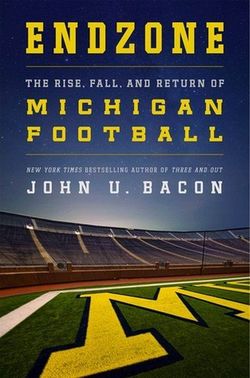
Hype the tradition, and the money will flow. Mess with it, and you’re playing with fire.
“The people who fill the stands year in and year out, rain or shine, are not customers,” John U. Bacon writes in his seventh book. “They’re believers. Break faith with your flock, and you will not get them back with fancier wine.”
That’s what happened to a proud Michigan program. In “Endzone: The Rise, Fall and Return of Michigan Football” (St. Martin’s Press; hardback; $27.99; 464 pages), Bacon writes about the loss of identity suffered by college football’s winningest program, and the efforts by students, lettermen, regents and alumni to reclaim it.
Written over a six-month span, “Endzone” is a well-researched page-turner that begins with Michigan’s storied past and ends with the backroom strategies that landed Jim Harbaugh as the Wolverines’ new coach. But it is the management style of Dave Brandon, who served as athletic director from 2010 to 2014, that is the meat of this book. Brandon, a former Michigan regent who left his post as a successful CEO of Domino’s Pizza — and took a big pay cut in the process — nevertheless had no experience in running a college athletic department.
 John U. Bacon's "Endzone" is his seventh book.
John U. Bacon's "Endzone" is his seventh book. Brandon dispenses with the past, overhauling the athletic department by replacing longtime staff members. Many longtime coaches left the program when they were unable to “win it all,” despite years of success. Brandon also created a culture of fear among his employees. The Friday afternoon email that announced the departure of another worker became a dreaded ritual.
“I’ve never covered a story so fraught with fear,” Bacon writes.
Brandon made no secret that he was comfortable with dispensing with the past in order to focus on the future. But in his defense, Brandon stuck up for the athletes he oversaw, establishing a rapport, always keeping his door open for any athlete who needed to talk. Punter Will Hagerup, whose backstory is another fascinating theme in “Endzone,” credits him as being a mentor.
“All I know is the guy changed my life, made me a better person, and I owe him everything,” said Hagerup, who failed two drug tests and is one of the good guys in “Endzone,” providing perspective on Brandon and on the locker room culture under Hoke, who was fired after the Wolverines’ 5-7 showing in 2014.
Brandon’s compassion for Michigan’s players did not always apply to other school members and alumni, Bacon asserts.
“I suggest you find a new team to support,” Brandon apparently wrote in response to a fan’s email. “We will be fine without you.”
“The emails were not the product of a heated moment,” Bacon writes. “They revealed the man for exactly who he was, by his own hand.”
Those actions would lead to Brandon’s resignation in late October 2014.
Brandon made no secret about remaking the athletic department in his own image, overhauling student ticket policies and working to maximize revenue and profits. While it’s true that Michigan’s revenues in athletics rose during Brandon’s tenure, so did its expenses.
And so did the criticisms. Michigan alums were offended when a large Kraft noodle appeared beneath the north scoreboard of the stadium with the message “You know you love it,” written on it. An advertising noodle at the Big House went over like, well, a wet noodle. It was quickly removed, because frankly, nobody loved it.
The Wolverines’ 41-30 victory against Notre Dame was chock full of Brandon’s marketing vision — flyovers, rock music and Beyoncé introducing the halftime show.
“That’s a pretty powerful message about what Michigan is all about, and that’s our job to send out that message,” Brandon said afterward.
Another message Brandon approved was the playing the “Chicken Dance” over the public address system when the game ended, a slap at the Fighting Irish for discontinuing its longtime series with Michigan.
Bacon pulls no punches about Brandon, who landed on his feet after he left Michigan and is now CEO for Toys “R” Us. He delves into Brandon’s wealth, his penchant for hobnobbing with players on the sidelines, cutting down a net after a huge basketball victory, and even singing Michigan’s fight song, “The Victors.”
Certainly, many of the criticisms were self-inflicted, as Brandon’s behavior was scorned by his fellow athletic directors. Not that he cared, mind you.
There are other delicious subplots in “Endzone.”
The story of student government leaders Michael Proppe and Bobby Dishell, who battled ticket policies, shows the determination and moxie of students who knew what was right and pursued the means to make it so.
Proppe’s presentation about Michigan’s attendance and the general admission seating policy is a dream chapter for a numbers geek, and especially entertaining as the student slices and dices the athletic department’s figures. While Michigan claimed its attendance had gone up under the new policy, Proppe skewered that by comparing the starting times of games in 2011-12 and 2013 and their attendance figures. A 3:30 game in 2011, for example, had better attendance than a game with the same starting time in 2013.
“When you’re analyzing attendance, the stratifying variable is the start time of the game,” Proppe said. “If you miss that, you’ll read the numbers incorrectly.”
When Proppe finished his presentation, the faculty gave him a standing ovation.
The biggest departure in Michigan’s athletic program was ignoring former AD Don Canham’s mantra about crisis management: “Never turn a one-day story into a two-day story.”
That was never more apparent than during a late September 2014 involving Michigan quarterback Shane Morris, who left the game after suffering a concussion and then was put back in the game when his replacement’s helmet popped off of the next play (requiring him to sit out a play) and the third string quarterback could not find his helmet. Morris stayed in for just one more play, but the fact that he was even allowed to return to the field was unacceptable.
So too, was the way Michigan’s PR staff handled the incident, making it much more than “a one-day story.”
This is also the incident that signals the end for Hoke. Bacon paints him as a compassionate coach, who saw early success with 11 victories in his first season as head coach. But by 2014 the program was spiraling downward, and when Hoke was fired after the season the search began for a new coach.
Actually, it had already begun, sparked by alumni and former lettermen that were hell-bent on returning Harbaugh back to his alma mater. The final pages of “Endzone” details the intrigue and back channel methods used to lure the mercurial Harbaugh back to Ann Arbor. Interim athletic director Jim Hackett used his talents to complete the deal.
“Some jobs are for God and country,” Bacon writes. “This was one of them.
“Michigan had its man.”
The concept of the “Michigan Man,” is ingrained in all UM alumni. There’s a mystique about it. How a person handles himself: does he do it with class, does he do it ethically, is it the right way?
During Brandon’s tenure, some alumni believed that idea had gone away.
Yale Van Dyne, a 1992 graduate, told Bacon that “our once classy and great school somehow feels cheap, tacky, and frankly, desperate for attention.”
“You can talk about being a Michigan Man, or you can be one,” Bacon concludes. “But you can’t do both.”
Bacon shows that image is trying to make a comeback. You don’t have to be a “Michigan Man” to enjoy reading “Endzone.” Bacon’s prose, wit, research and attention to detail makes this book a must-read for anyone who loves college football.
 RSS Feed
RSS Feed
